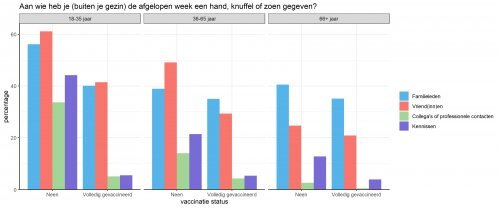Non-vaccinated Belgians have more physical interactions
August 24th 2021
Large majority of participants in the Great Corona Study spontaneously share vaccination status
A large majority of vaccinated Belgians tell family and friends whether they have been vaccinated; non-vaccinated people are less willing to do so. On the other hand, the latter group is having more and more physical interactions: they are kissing, cuddling and partying again. The Big Corona Study found this and more.
Tuesday saw the 42nd round of the Great Corona Study – an initiative of UAntwerp, in cooperation with UHasselt, KU Leuven, ULB and supported by a financial boost from the Research Foundation Flanders (FWO). At the end of the summer holidays, 13,000 Belgians found some time to complete the questionnaire. That is 1,000 fewer than in the previous questionnaire, but still a good number.
An initial analysis by the scientists yielded the following results:
Vaccination status
Participants say that they willingly share their vaccination status, although this mainly depends on whether they have been vaccinated. Almost all vaccinated people are willing to share their status with family, friends and colleagues, spontaneously or otherwise. One in four non-vaccinated people would not share this with colleagues and one in eight with family and friends. This could potentially create tensions in the workplace, as a majority of vaccinated people expect colleagues to be open about their vaccination status.
Contacts
Participants who have not been vaccinated have more physical interactions, regardless of age group. This means more kissing, hugging and shaking hands. Vaccinated people only shake hands with family members and friends; non-vaccinated people also shake hands with colleagues and acquaintances.

Slowly but surely, more participants (12%) are partying again. Mostly non-vaccinated people attended a party with about 50 guests last month.
Vaccinating children
The actual vaccination coverage of children is much higher than previously indicated. Almost all 16–17 year olds and 12–15 year olds whose parent completed the questionnaire and was vaccinated received at least one dose of the vaccine, accounting for 91%. At the end of June, 83% of vaccinated parents said their child (aged 12–15) would probably also get vaccinated. We see the same trend for 16–17 year olds.
Some children of non-vaccinated participants have since also been vaccinated: 5/21 for the group of 16–17 year olds and 1/25 for the group of 12–15 year olds. The other children in these groups, as well as all children of unvaccinated parents under the age of 12, are unlikely to get vaccinated. Of course, the latter is not (yet) recommended.